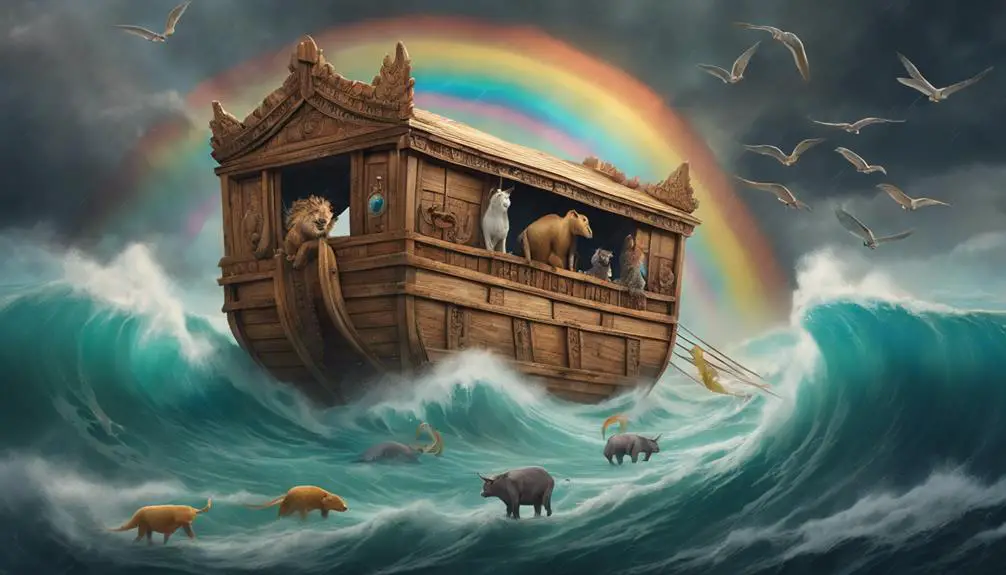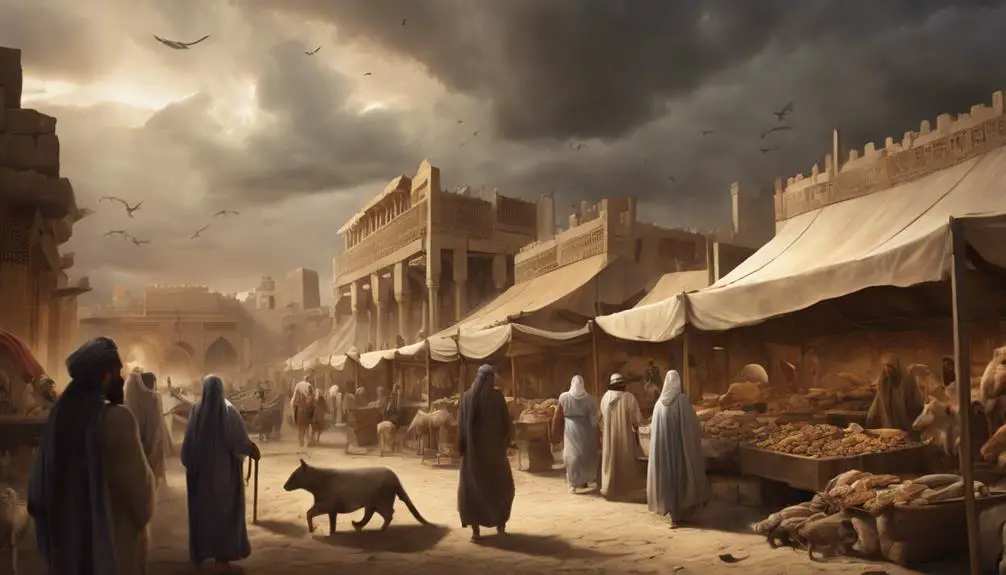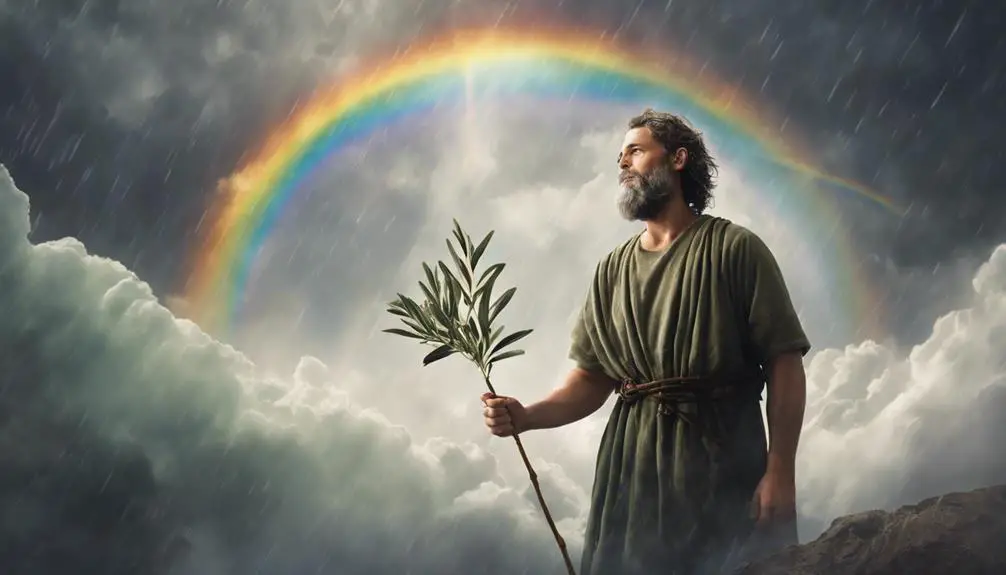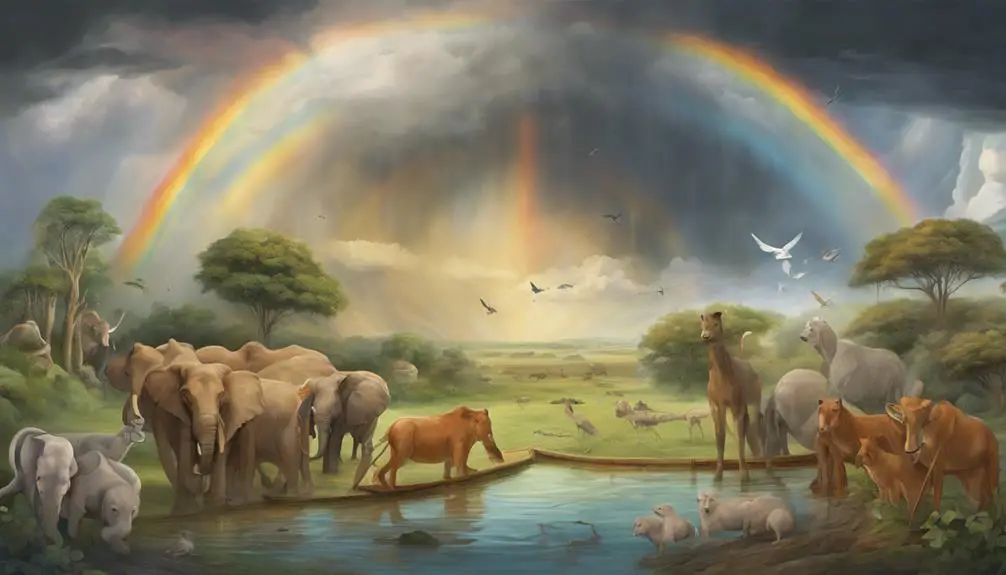Investigate the parallels between 'the days of Noah' and today's world, uncovering lessons on morality, survival, and divine intervention.

As in the Days of Noah Bible
Just as Pandora's box unleashed chaos upon the world, the biblical narrative of Noah's time reveals a period steeped in moral decay and divine judgment.
You'll find that exploring this epoch isn't merely an exercise in historical curiosity; it's a mirror reflecting our own societal challenges. The tale of Noah, distinguished by his righteousness in a world gone awry, offers more than ancient lore. It presents a compelling dialogue on virtue, vice, and the consequences of both.
As we navigate this discussion, consider what lessons we might glean for our contemporary world, left on the brink of asking, 'How close are we to 'the days of Noah'?'
Key Takeaways
- Noah's story warns of the consequences of moral decay and the importance of righteousness.
- Divine intervention can serve as a reset, offering a chance to restore ethical balance.
- Modern challenges like climate change mirror the biblical narrative's call for collective moral action.
- Lessons from Noah emphasize the need for humanity to act responsibly in the face of global crises.
Historical Context

To understand the narrative of 'As in the Days of Noah' within the Bible, it's essential to delve into the historical context that shaped this pivotal period. You're looking into an era where ancient civilizations thrived, each with its own culture, beliefs, and accomplishments. Yet, amidst these advancements, the biblical narrative introduces the concept of a global flood—a cataclysmic event that not only reshaped the physical landscape but also marked a significant turning point in human history.
This period is characterized by remarkable achievements in architecture, agriculture, and society's organization. However, it's the interaction between these ancient civilizations and the divine, as depicted in biblical texts, that brings a deeper understanding of the 'Days of Noah.' The global flood, as narrated, wasn't merely a natural disaster but a pivotal event with profound theological implications.
Moral Decay and Judgment
Amidst the remarkable achievements of ancient civilizations, a pervasive moral decay and divine judgment emerged as central themes in the narrative of the 'Days of Noah'. This period, often depicted as a time of widespread corruption and ethical degradation, saw societies straying far from moral rectitude, which in turn prompted divine intervention as a corrective measure. The texts suggest a direct correlation between the moral decay of a civilization and the inevitability of societal collapse, underscored by the notion that divine judgment serves both as a consequence of and a response to such decay.
This narrative emphasizes the role of divine intervention not merely as punitive action but as a means to restore moral equilibrium. It posits that when societies reach a tipping point of moral degradation, divine judgment becomes inevitable, leading to societal collapse. This collapse, however, isn't portrayed as the end but as a necessary precursor to rebirth and renewal. Through this lens, the 'Days of Noah' serve as a cautionary tale, highlighting the intrinsic link between moral conduct and the stability of societies. It underscores the necessity for adherence to moral principles as a bulwark against the disintegration of societal structures.
Noah's Righteousness

In stark contrast to the pervasive moral decay of his time, Noah stood out due to his unwavering righteousness and adherence to divine principles. His life exemplified a commitment to living in accordance with higher standards, setting a precedent for moral integrity and devout faithfulness. Analyzing Noah's righteousness, especially in relation to his responsibilities, offers insight into his character and the challenges he faced:
- Devotion to Divine Commands: Noah's unwavering faith in following divine instructions showcased his righteousness. His commitment wasn't just spiritual; it translated into physical action, demonstrating a holistic approach to obedience.
- Animal Care: Noah's responsibility extended beyond human relations, encompassing animal care. This aspect of his life underscores a profound respect for all of God's creations. His ability to manage and care for the animals, ensuring their safety and well-being aboard the ark, highlights his compassionate and righteous nature.
- Construction Challenges: The task of building the ark, a monumental undertaking, tested Noah's faith and perseverance. Facing construction challenges, including sourcing materials and engineering a vessel capable of withstanding the flood, Noah's resolve and trust in divine guidance remained unshaken.
Through these aspects, Noah's righteousness emerges not only as a spiritual attribute but as an active, living testament to faith in action, setting a standard for enduring righteousness amidst adversity.
Modern Day Parallels
Reflecting on Noah's righteousness and the challenges he faced, we can find striking parallels in today's society where individuals and communities strive to uphold moral integrity in an often morally ambiguous world. Today's ethical landscapes are increasingly complex, influenced significantly by climate change and technological advancements.
Climate change, akin to the deluge in Noah's story, presents a formidable challenge that tests humanity's stewardship of the Earth. The moral imperative to address environmental degradation and its disproportionate impact on the vulnerable echoes the biblical call to righteous living amidst widespread corruption. As Noah was called to build the ark, today's society is tasked with crafting sustainable solutions that safeguard the planet for future generations.
Technological advancements, while offering remarkable benefits, also introduce ethical dilemmas reminiscent of the challenges faced by Noah. The rapid pace of innovation often outstrips the development of moral and ethical frameworks to guide its use. As in Noah's time, the potential for technological misuse to exacerbate social inequities or undermine human dignity presents a critical test of moral integrity.
In navigating these challenges, the story of Noah offers a timeless reminder of the importance of righteousness, even in the face of societal ambivalence or opposition.
Lessons and Warnings

Delving into the narrative of Noah, we uncover critical lessons and warnings that resonate profoundly with the ethical and environmental dilemmas facing our world today. This story, steeped in divine intervention and societal response, offers a rich tapestry for understanding the consequences of our actions and the possibility of redemption.
Here are three key takeaways:
- Divine Intervention: The story of Noah illustrates a moment where divine intervention serves as a reset for humanity, highlighting the importance of heeding warnings and changing course to avert disaster. It's a reminder that, while we may not face a literal flood, the metaphorical floods caused by climate change and environmental degradation require urgent attention and action.
- Societal Response: Noah's tale is a cautionary example of how society's response to impending doom can vary greatly, from denial and indifference to proactive preparation. It underscores the need for collective action in the face of global challenges, rather than waiting for a crisis to force our hand.
- Moral Accountability: Above all, the narrative emphasizes the significance of moral accountability and the role it plays in shaping our future. It suggests that survival isn't just a matter of physical preparedness, but also ethical integrity.
Frequently Asked Questions
How Do Different Religious Traditions Interpret the Phrase "As in the Days of Noah"?
When you explore how various religious traditions interpret 'as in the days of Noah,' you're delving into discussions that often highlight Noah's lineage and the covenant's significance.
These discussions usually analyze the moral and ethical dimensions of humanity during Noah's time, comparing them to contemporary societal values.
Each tradition brings its unique perspective, enriching the understanding of the phrase while emphasizing the importance of adherence to divine guidance and moral integrity.
Are There Any Scientific Theories or Evidence That Support the Events Described During the Days of Noah?
You're exploring if scientific theories or evidence back the events described during the days of Noah, focusing on plate tectonics and genetic manipulation. While plate tectonics explains the movement of Earth's lithosphere, it doesn't directly confirm any specific biblical flood narratives.
Similarly, genetic manipulation, though advancing rapidly, hasn't produced evidence to support the unique events from Noah's time. Both fields offer fascinating insights, but they don't directly corroborate those ancient accounts.
How Has the Concept of "As in the Days of Noah" Been Portrayed in Popular Culture and Media?
You'll find that the concept of 'as in the days of Noah' has been vividly brought to life in popular culture and media through various Noah's Ark replicas and adaptations of Flood myths.
These portrayals often explore themes of apocalypse, salvation, and human ethics.
They're not just retellings but reinterpretations, blending ancient narratives with modern concerns, thus keeping the story relevant and thought-provoking in contemporary discussions.
What Psychological or Sociological Insights Can We Draw From the Human Behaviors Described in the Days of Noah Narrative?
You can draw significant insights from human behaviors in narratives of moral decay and societal collapse. These stories highlight how societal norms and ethics deteriorate, leading to widespread chaos. They underscore the importance of maintaining collective values to prevent societal downfall.
Analyzing these behaviors offers a deeper understanding of human nature, societal bonds, and the consequences of neglecting moral and ethical standards, providing valuable lessons for contemporary societal dynamics.
How Do Climate Change and Environmental Issues Today Compare to the Environmental Descriptions of the Days of Noah?
Today's escalating climate crisis, with a 1.2°C average temperature rise since the 19th century, starkly contrasts with pre-flood ecology.
Unlike the Noah's Ark construction narrative, our response involves global cooperation and technological innovation rather than divine intervention.
This analysis reveals the urgent need for adaptive strategies to mitigate environmental degradation, emphasizing the importance of learning from historical and mythological precedents to navigate our current ecological challenges effectively.
Conclusion
In analyzing the narrative of Noah, it's evident that moral decay and judgment are central themes. Interestingly, a 2020 survey found that 82% of Americans believe society is in moral decline, echoing the sentiments of Noah's time.
Noah's righteousness amid widespread corruption serves as a critical lesson. Modern parallels suggest the importance of maintaining ethical integrity in the face of societal decay.
This story, therefore, not only offers a historical perspective but also a timeless warning about the consequences of moral lapse.



Sign up